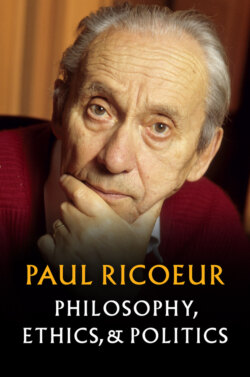Philosophy, Ethics, and Politics

Реклама. ООО «ЛитРес», ИНН: 7719571260.
Оглавление
Paul Ricoeur. Philosophy, Ethics, and Politics
Table of Contents
Guide
Pages
Philosophy, Ethics, and Politics
Copyright Page
Preface: Paul Ricoeur, Political Educator
Notes
1. I’m Waiting for the Renaissance1
Notes
2. Sketch of a Plea for the Capable Human Being1
Notes
3. Paul Ricoeur: Act, He Said1
Note
4. The Polis is Fundamentally Perishable – Its Survival Depends on Us1
Notes
5. History as Narrative and as Practice1
Notes
6. Justice and the Market: A Dialogue Between Michel Rocard and Paul Ricoeur1
An ethics of responsibility
From procedures to values
State, violence, and legitimacy
Notes
7. For an Ethics of Compromise1
Notes
8. Any News of the War?1
Notes
9. The Challenge of Evil for Philosophy1
Notes
10. Ethics, Politics, Ecology1
Notes
11. Ethics, Between Bad and Worse1. Ethics and living-well
Ethics and reciprocity
Ethics and exceptions
Ethics and dogmatism
Notes
12. Art, Language, and Aesthetic Hermeneutics1
Notes
Index
POLITY END USER LICENSE AGREEMENT
Отрывок из книги
Paul Ricoeur
Edited by Catherine Goldenstein
.....
I had not been happy in that system for pedagogical reasons: it is a system that gives little credit to students, that does not afford them the means to do research. An American student has no more than twenty hours of class, while a French student often has a lot more, up to thirty-five hours in some disciplines. A student’s work consists in taking in the courses and regurgitating them; there is no engagement with the texts, with the library. This question really disturbs me: how is it possible that societies so similar in other ways, advanced industrial societies, can have produced such different systems of education? This is indisputably where the imprint of history is the strongest, to such an extent that our systems are practically incommunicable, even in Europe. Systems of education are the most difficult to reform. It is a paradox that a system of education is supposed to be the most forward looking, since by definition we are dealing with people who will be operational ten or twenty years later. Yet we have a tendency to teach as we were taught; there is something very regressive in the role of a teacher. In systems in which innovation is more highly prized, as in the American system, one is led to reflect more on one’s practice and to be creative, inventive. You can have a short seminar, a seminar where you never speak, a seminar where two or three people speak: anything is permitted, as long as the students show up.
You have been very active in the International Institute of Philosophy, and have served as its president. What role does this kind of institution play?
.....